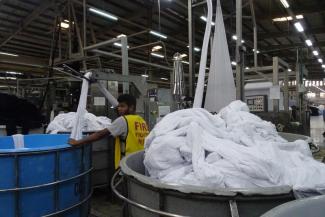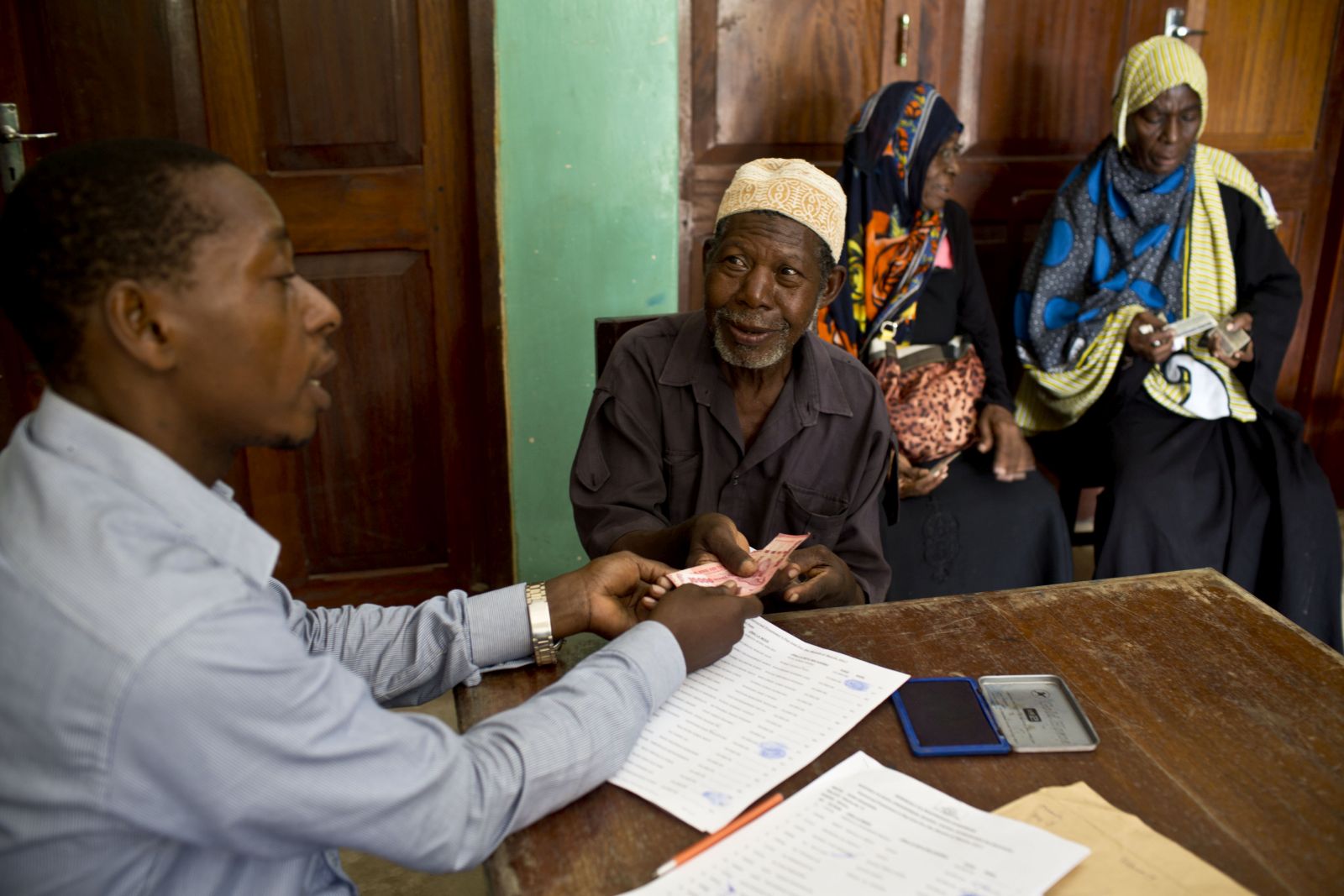Development Effectiveness Rating
Measuring how good a job is

More than 70 % of poor people think a job would offer the best way to escape poverty. Indeed, research shows that wages and salaries contribute significantly to reducing poverty in many countries. The private sector accounts for 90 % of all jobs worldwide. Job creation is one of the key contributions it can make towards achieving global sustainability goals. Of course, the new jobs should be fair and good: fair in the sense of meeting core labour standards and good in the sense of benefiting people, society and business at local levels as well as driving national development.
DEG’s Development Effectiveness Rating is one of the first international rating systems of its kind. It not only takes note of the number of jobs an enterprise creates, but also assesses the degree to which the core labour standards of the International Labour Organization (ILO) are met. Moreover, it takes into account issues such as occupational safety and the quality of humanresources management.
If a company complies with the core ILO labour standards and its occupational safety and HR management is good, the number of jobs is counted in full. If an enterprise does not meet the criteria, the number of new jobs is divided by a number that depends on the level of norm fulfilment. In other words, the jobs these companies create only count partially in the Development Effectiveness Rating.
Five outcome categories
The new rating and monitoring system is the fruit of years of DEG experience in measuring development impacts at client enterprises. Its design was supported by an international panel of experts. The Development Effectiveness Rating takes into account five categories of outcomes:
- decent jobs,
- local income,
- market and sector development,
- environmental stewardship and
- community benefits.
The creation of decent jobs and the generation of local income are crucial for achieving the Sustainable Development Goals (SDGs). The private sector generates local income in form of wages and salaries as well as taxes, concessions and licences. The more a company’s business model is rooted in the local context, the more it will normally contribute to local income generation since it will be employing local people, paying local taxes and sourcing inputs from local suppliers. The Development Effectiveness Rating takes account of the respective local purchasing power in relation to the local income generated. It thus reflects the fact that the same income may have different impacts in the contexts of different countries. Annual changes are taken into account too.
Market and sector development: The development impact of any specific business activity can differ from one country to another. The less developed a country is, the greater the impact of a single investment is likely to be. After all, investments are more desperately needed in poor countries. Investments into sectors that drive the further development of the private sector, moreover, are also likely to have a strong impact. Accordingly, the Development Effectiveness Rating gauges the relevance of an investment in regard to the development of various sectors of the country in question. Other aspects of market development are factored in too; they include promoting competition or innovative products and services, for example.
Environmental stewardship: All over the world, large parts of the private sector rely on natural resources, either in their supply chains or their core business. Sustainable development depends on environmental protection, climate-change mitigation and resource efficiency. The private sector must play an active part by, for example, complying with international standards, taking action to make businesses more sustainable or generating renewable power. The Development Effectiveness Rating evaluates compliance with environmental standards as well as the quality of environmental management and reductions in the volume of greenhouse-gas emissions.
Community benefits: Many entrepreneurs are active citizens who play an important role in society. This is not only about considering their businesses’ impacts on local communities and implementing health and safety management systems in line with DEG requirements. Entrepreneurs may also contribute to development by contributing to improving local infrastructure and actively engaging with local communities. The Development Effectiveness Rating appraises two levels:
- First, it assesses what risks a business implies for the local community, how those risks are managed, and how the community can appeal to the company.
- Second, it records the (financial) contributions a business makes to community development.
A Bangladeshi example
Adherence to international labour standards not only benefits employees, but employers too. This is evident, for example, at the DBL Group, a garments producer in Bangladesh, in which DEG has invested since 2004 (see article by Sabine Balk in D+C/E+Z e-Paper 2017/05, p. 13). The DBL Group is operating in a very competitive sector which is typically marked by harsh labour conditions. Nonetheless, the DBL Group has taken various measures that have significantly improved the working conditions for its workforce.
For instance, it has invested extensively in occupational safety to comply with international building and fire safety standards. Moreover, DBL employees can take advantage of the company’s fair-price shop, health-care centre and day-care service for young children. The wages DBL pays are above the national industry’s average. A range of programmes offers skills training. Female staff members benefit in particular. The company, in turn, benefits from greater efficiency, productivity and production quality. Absenteeism and staff fluctuation are reduced.
The Development Effectiveness Rating for the DBL Group highlights the following aspects:
- The company employs some 28,000 people in jobs that are commensurate with high labour standards. It is growing dynamically. Since cooperation with DEG started in 2004, the workforce has grown by 70 %. Moreover, the garments industry has a high potential of indirect employment. The DBL Group thus gets high ratings in the “decent jobs” category.
- The company generates local income worth around € 140 million a year. It therefore makes a major contribution to local resource mobilisation in a developing country with a rather low per-capita GDP.
- In the market and sector development field, the company deserves praise for innovation. For example, it uses cutting-edge dye technology.
- DBL complies with international environmental standards and has demonstrably increased its energy and resource efficiency. These are important achievements in the environmental stewardship category.
- The local community benefits considerably. In cooperation with international and local partners, the DBL Group is committed to community development and is contributing to food, education and health-care programmes.
Overall, the company is therefore rated “very good” in terms of its development impacts.
Transparent, motivating system
The Development Effectiveness Rating is innovative in the sense of assessing private-sector companies’ developmental impacts in regard to five result categories. In practice, DEG now documents the baseline for all investments (impacts on development prior to DEG investment) and compiles an ex-ante assessment (estimating the development impacts in five years). The on-going contributions of DEG-financed enterprises are reviewed annually, so changes in development impacts can be identified and supported. The rating also facilitates the analysis of an entire sector’s or region’s development.
Christiane Rudolph heads the DEG’s department for corporate strategy and development policy. She previously worked in the sustainability department.
christiane.rudolph@deginvest.de
Link
DEG study on the DBL Group (in German):
https://www.deginvest.de/DEG-Dokumente/Die-DEG/Was-wir-bewirken/Fallbeispiel_DBL-Group_2015.pdf













